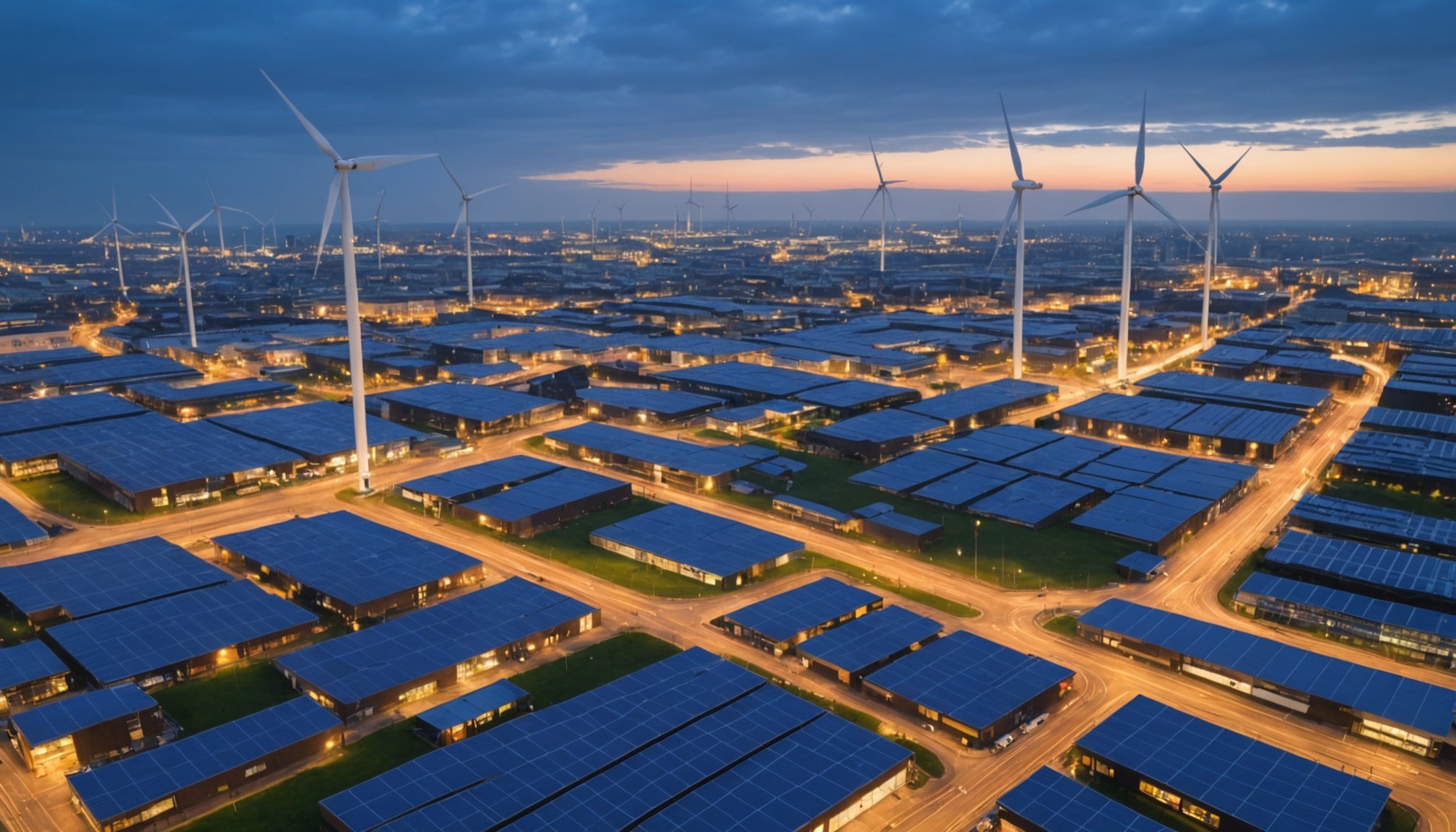Overview of Smart Grid Innovations
The smart grid represents a leap forward in how electricity is managed and distributed. Essentially, it’s an advanced electricity network infrastructure that uses digital communication technology to detect, react to, and forecast local changes in usage. The core components include smart meters, sensors, and automation systems, ensuring more efficient and reliable energy distribution.
A significant benefit of the smart grid is its capability to integrate renewable energy sources. This energy distribution model addresses the intermittent nature of renewables, such as solar and wind, by automatically adjusting supply to meet demand. This is crucial for enhancing grid stability and paving the way towards sustainable energy solutions.
Also to discover : Learn quran online : master recitation and arabic with expert teachers !
In the UK, the traditional energy distribution systems are being increasingly challenged to accommodate growing demands and environmental goals. The smart grid stands out as a promising solution, facilitating not only improved monitoring and control but also increasing the durability and resilience of the energy infrastructure.
The necessity of upgrading to smart grid systems is driven by the urgent need to shift towards more sustainable, reliable, and efficient energy distribution methods. The UK’s adoption of these innovations could significantly contribute to achieving its ambitious energy targets and creating a more resilient energy network.
Additional reading : Harnessing Smart Grid Innovations: Boosting Energy Efficiency Across the UK
Key Technologies Driving Smart Grid Innovations
Smart Metering and IoT play pivotal roles in enhancing the capabilities of modern energy systems.
Smart Metering and Data Analytics
Smart meters are revolutionising how energy consumption is managed. By providing real-time data, they enable both consumers and utility providers to make informed decisions regarding energy use, improving overall system efficiency. Additionally, data analytics tools harness this information to predict consumption patterns, enhance grid reliability, and identify areas for efficiency improvements. This proactive approach minimises energy waste and reduces operational costs.
Internet of Things (IoT) in Energy Systems
The Internet of Things (IoT) integrates countless devices within the energy grid, creating a network that communicates seamlessly. This interconnectedness supports automation and remote management, optimising energy flow and identifying faults swiftly. IoT’s impact extends to facilitating smoother integration of distributed energy resources, improving resilience and responsiveness to changing demands.
Integration of Renewable Energy Sources
The integration of renewable energy is a cornerstone of the smart grid. Despite the challenges posed by the intermittent nature of renewables, innovative grid technologies allow for efficient adaptation to fluctuating power inputs. Solutions such as advanced storage systems and flexible grid interconnections ensure a stable energy supply, supporting the UK’s shift towards a sustainable energy future.
Benefits of Smart Grid Implementation
The smart grid brings forth numerous advantages, focusing on efficiency, reliability, and sustainability. Enhanced energy efficiency is achieved through real-time monitoring and automation, allowing for precise energy distribution adjustments. This helps in reducing waste, optimizing usage, and lowering energy costs for both suppliers and consumers.
In terms of reliability, smart grids utilize advanced sensors and communication technologies that quickly identify and address faults in the system. This minimizes downtime and enhances service continuity, essential for both residential and industrial users. Smart grids also improve disaster response capabilities, ensuring that disruptions are managed swiftly and effectively.
Sustainability is bolstered by the smart grid’s integration of renewable energy sources. By efficiently managing resources such as solar and wind, smart grids help decrease dependency on fossil fuels, significantly reducing carbon footprints. This aligns with national sustainability goals, pushing towards a greener and more eco-friendly energy landscape.
Incorporating smart grid technologies not only fortifies the energy distribution system but also plays a crucial role in meeting the UK’s environmental objectives. By fostering a more resilient and adaptable infrastructure, smart grids are at the forefront of modern energy solutions.
Case Studies: Successful Smart Grid Projects in the UK
Delving into practical implementations, certain UK initiatives demonstrate the benefits of smart grid technologies in transforming energy distribution. These case studies provide insights into how modern solutions can tackle existing challenges.
Project: Electricity North West
Electricity North West has emerged as a pioneer through its innovative energy strategies. They have adopted an active network management system to enhance grid efficiency. By optimising energy flow and integrating renewable sources, they ensure a more reliable supply and reduced carbon footprint. Their approach underscores the significance of innovation in reshaping traditional electricity models.
Project: UK Power Networks
UK Power Networks leads advancements with projects focused on decentralised energy systems. By leveraging IoT technologies and smart metering, they improve energy quality and responsiveness to consumer demands. This approach validates how smart grids can accommodate urban growth and evolving consumption patterns.
Community-Driven Initiatives
Grassroots movements across communities highlight the role of collective action in smart grid adoption. By engaging residents in energy-saving practices and local renewable projects, these initiatives illustrate the power of collaborative efforts in achieving sustainability. Such engagement is crucial in promoting widespread acceptance and success of intelligent grid systems.
Policy Implications and Regulatory Framework
The integration of smart grid technologies in the UK requires robust regulations and government policy. The UK has introduced several policies to promote the development of these advanced energy systems. These initiatives aim to enhance energy efficiency and foster a transition to renewable sources.
Regulatory challenges remain a hurdle for energy providers. Lengthy approval processes and frequent policy changes can delay developments and increase costs. To overcome these, energy providers advocate for streamlined regulations and improved governmental support.
For policymakers, strategic recommendations include fostering stronger public-private partnerships to encourage investments in smart grids. Additionally, ensuring that the regulatory framework evolves to accommodate technological advancements is crucial. By establishing clearer guidelines and reducing bureaucratic barriers, the UK can accelerate the deployment of smart energy solutions.
To bolster energy strategy, it’s vital to incorporate feedback from industry stakeholders. Engaging with experts and industry specialists can lead to more nuanced policies that address emerging challenges effectively. By aligning government policy with industry needs and technological progress, the UK can strengthen its position as a leader in smart grid innovation and secure a sustainable energy future.
Expert Opinions on Future Trends
Understanding the trajectory of smart grid innovations involves delving into insights from industry leaders and energy analysts. Experts highlight the transformative potential of advanced technologies in reshaping energy distribution. They emphasize the role of data-driven decision-making in optimizing grid efficiency and sustainability.
Interviews with Industry Leaders
Discussions with figures at the forefront of the energy sector reveal optimism about the integration of renewable energy. Leaders envision that merging cutting-edge technologies like artificial intelligence and energy storage systems will enhance the grid’s adaptability and resilience. Their insights underscore the strategic importance of embracing technological advancements to remain competitive.
Insights from Energy Analysts
Energy analysts focus on the importance of regulatory frameworks and investment. They argue that overcoming financial and infrastructural barriers requires collaboration between public and private sectors. Analysts advocate for a data-centric approach to predict consumption patterns, enabling dynamic energy management.
Future Technology Predictions
As innovation progresses, the anticipated focus will be on developing smarter, decentralized grids. Predictive maintenance, enabled by advanced analytics, is expected to become standard, minimizing disruptions and maintenance costs. Additionally, the integration of electric vehicles into the grid is seen as a key development, furthering the shift toward a sustainable energy ecosystem.
Expert Opinions on Future Trends
Insights from industry leaders and analysts shape our understanding of smart grid innovations. Interviews with energy sector frontrunners reveal that advanced technologies like artificial intelligence and enhanced energy storage systems are pivotal in bolstering grid resilience and adaptability. These experts maintain that embracing such technologies is critical for maintaining a competitive edge and achieving sustainable energy objectives.
Energy analysts underscore the necessity of an adaptable regulatory framework paired with strategic investments. They argue that barriers, both financial and infrastructural, can be mitigated through collaboration across the public and private sectors. This approach not only drives innovation but also ensures dynamic energy management by leveraging a data-centric approach to predict consumption patterns.
Looking forward, experts highlight the transition toward decentralized grids as a focal point of technological advancement. Predictive maintenance, powered by sophisticated analytics, is anticipated to become widespread, reducing both disruptions and operational costs. Moreover, the anticipated integration of electric vehicles into the energy grid represents a substantial stride toward a more sustainable energy ecosystem, aligning with global environmental goals. Such advancements aim to redefine energy management, emphasizing adaptability and long-term environmental benefits.









